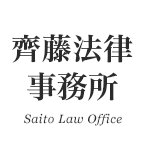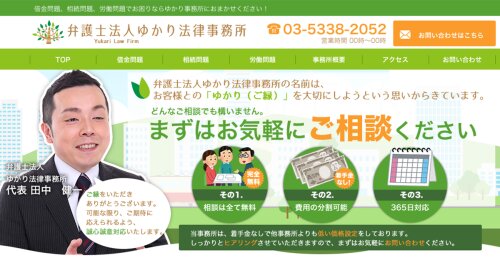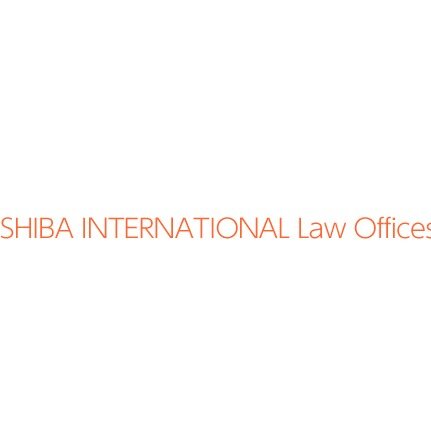Best Debt & Collection Lawyers in Tokyo
Share your needs with us, get contacted by law firms.
Free. Takes 2 min.
List of the best lawyers in Tokyo, Japan
About Debt & Collection Law in Tokyo, Japan
Debt & Collection law in Tokyo, Japan is governed by a combination of Japanese civil laws and specific statutes that regulate the methods by which debts can be collected. These laws are designed to protect the rights of both debtors and creditors. The Japanese Civil Code sets out the general principles of contractual obligations, while the Act on Prohibition of Private Monopolization and Maintenance of Fair Trade (also known as the Japanese Anti-Monopoly Act) includes regulations on unfair collection practices. Courts in Tokyo also consider precedents from past cases when making judgments on Debt & Collection issues.
Why You May Need a Lawyer
Individuals and businesses may require legal help in debt and collection matters for a variety of reasons. If you are unable to pay your debts, a lawyer can advise you on options such as repayment plans or bankruptcy. If you are a creditor, a lawyer can help enforce a debt, navigate the process of securing a court judgment, and offer guidance on legal collection practices. Additionally, legal assistance may be crucial if you are dealing with cross-border debts or if there is a dispute over the validity or the amount of the debt.
Local Laws Overview
The key aspects of local laws concerning Debt & Collection in Tokyo, Japan, include:
- Limitation Period: There is a statute of limitations for debt collection, usually set at 5 years for ordinary claims, and this can be extended to 10 or 15 years if a judgment has been obtained.
- Consumer Protection: Consumers are protected against aggressive and unfair collection practices, with specific laws ensuring that communication from collectors is not harassing or invasive.
- Bankruptcy Law: This allows individuals and businesses in dire financial straits to start afresh by forgiving debts that they are unable to pay under certain legal proceedings.
- Secured Transactions: These are governed by the Civil Code and the Act on Special Provisions, etc. of the Civil Intermediary Act, which set out the rights of secured creditors and procedures for attachment and sale of collateral.
Frequently Asked Questions
What should I do if I am unable to repay my debt?
If you are unable to repay your debt, it is advisable to consult with a debt lawyer who can provide options such as negotiating with creditors for a repayment plan or, if necessary, filing for bankruptcy.
Are there restrictions on how debt collectors can contact me?
Yes, Japan has consumer protection laws that limit how and when debt collectors can contact debtors, prohibiting harassment and respecting privacy.
What is the statute of limitations on collecting a debt in Tokyo?
The statute of limitations for collecting a debt in Tokyo is generally 5 years, but it can be extended if a judgment has been obtained.
Can a debt collector seize my property without court permission?
In Japan, a debt collector generally cannot seize property without obtaining a court judgment and the appropriate legal proceedings for enforcement.
What happens if I ignore debt collection attempts?
Ignoring debt collection attempts can lead to legal action against you, potentially resulting in a court judgment and compulsory enforcement like salary garnishment or asset seizure.
Is bankruptcy my only option if I have substantial debt?
No, bankruptcy is not your only option. Alternatives include negotiating with creditors, restructuring debts, or using out-of-court workouts. However, it can sometimes be the most appropriate path, depending on your circumstances.
How do I know if the debt claimed is legitimate?
To verify a debt's legitimacy, request detailed information about the debt from the collector, including the original creditor's name and the amount of the debt, and compare it with your own records.
What should I do if I feel my rights have been violated by a debt collector?
If you believe your rights have been violated by a debt collector, you can lodge a complaint with consumer protection agencies or seek legal counsel to address the issue.
Can creditors from another country collect debts in Tokyo?
International creditors may pursue debt collection in Tokyo but they must comply with Japanese laws and may need to go through legal proceedings in Japan to enforce the debt.
Is there a government body overseeing debt collection practices in Japan?
While there is no specific government body exclusively for overseeing debt collection, various agencies, including the Consumer Affairs Agency, deal with debt collection issues and can provide assistance.
Additional Resources
For individuals seeking further information or assistance with Debt & Collection, the following resources in Tokyo, Japan, may be useful:
- Consumer Affairs Agency (CAA): Provides consumer protection and education, including issues related to debt collection.
- Japan Legal Support Center: Offers legal advice and support for individuals having difficulties, including those in financial distress.
- Japan Financial Services Association: Offers information on financial services and consumer rights in Japan.
Next Steps
If you need legal assistance in debt and collection law, consider taking the following steps:
- Document all communications and transactions: Keep records of all correspondence with creditors or debt collectors, as well as any payments made.
- Consult a specialized attorney: Seek out an attorney who has experience with Japanese debt and collection law to offer advice specific to your situation.
- Explore resolution: Work with your attorney to explore options for repayment, settlement negotiation, or legal proceedings if necessary.
- Act timely: Do not delay in seeking legal help since waiting too long can potentially limit your options or rights under the law.
Lawzana helps you find the best lawyers and law firms in Tokyo through a curated and pre-screened list of qualified legal professionals. Our platform offers rankings and detailed profiles of attorneys and law firms, allowing you to compare based on practice areas, including Debt & Collection, experience, and client feedback.
Each profile includes a description of the firm's areas of practice, client reviews, team members and partners, year of establishment, spoken languages, office locations, contact information, social media presence, and any published articles or resources. Most firms on our platform speak English and are experienced in both local and international legal matters.
Get a quote from top-rated law firms in Tokyo, Japan — quickly, securely, and without unnecessary hassle.
Disclaimer:
The information provided on this page is for general informational purposes only and does not constitute legal advice. While we strive to ensure the accuracy and relevance of the content, legal information may change over time, and interpretations of the law can vary. You should always consult with a qualified legal professional for advice specific to your situation.
We disclaim all liability for actions taken or not taken based on the content of this page. If you believe any information is incorrect or outdated, please contact us, and we will review and update it where appropriate.















